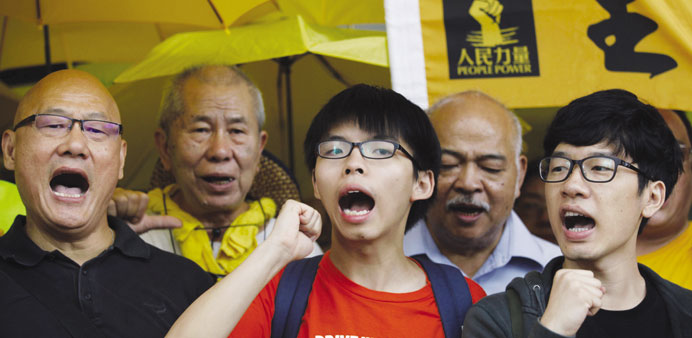(Front from left): Pro-democracy activists Albert Chan, Joshua Wong and Nathan Law shout slogans after their appearance at the Eastern Law Courts in Hong Kong yesterday.
AFP/Hong Kong
Hong Kong student leader Joshua Wong and three other pro-democracy activists entered “not guilty” pleas in court yesterday over charges related to an anti-China protest last year.
They have accused the city authorities of a witch hunt against political campaigners after a contentious Beijing-backed reform package was vetoed last month.
The rejection of the government’s bill was an unprecedented rebuke to Beijing and left the city politically polarised.
Wong, 18, the teenage face of the pro-democracy movement, is charged with obstructing police at a small peaceful protest in June 2014 -- before large-scale democracy rallies gripped the city.
Nathan Law, 22, leader of Hong Kong’s major university student union, and activists Raphael Wong and Albert Chan -- a legislator for the People Power party -- appeared on the same charges.
They were among dozens who had gathered outside Beijing’s representative office in Hong Kong to oppose a “white paper” from China that asserted its control over the semi-autonomous city and a reproduction of the document was burned.
“It is not a crime to burn the white paper - shame on political suppression,” said Raphael Wong, a member of the League of Social Democrats party, as he entered his plea, ripping up a copy of the white paper, before being warned by judge Bina Chainrai not to use the courtroom to express his political views.
Joshua Wong spoke only to confirm his plea. “Joshua Wong is not guilty,” he said.
Around 20 protesters carrying yellow umbrellas gathered outside the court and burned a copy of the white paper, shouting: “Return my freedom of expression, step down Leung Chun-ying,” referring to the city’s unpopular leader.
“This is something that happened over a year ago and there were no arrests,” said Chan after the hearing.
“This is 100% political persecution.” Chainrai questioned why the four had been arrested and brought to court after more than a year.
“Why has it taken so long?” she asked, saying that a “stay” of proceedings could be sought by the defence.

